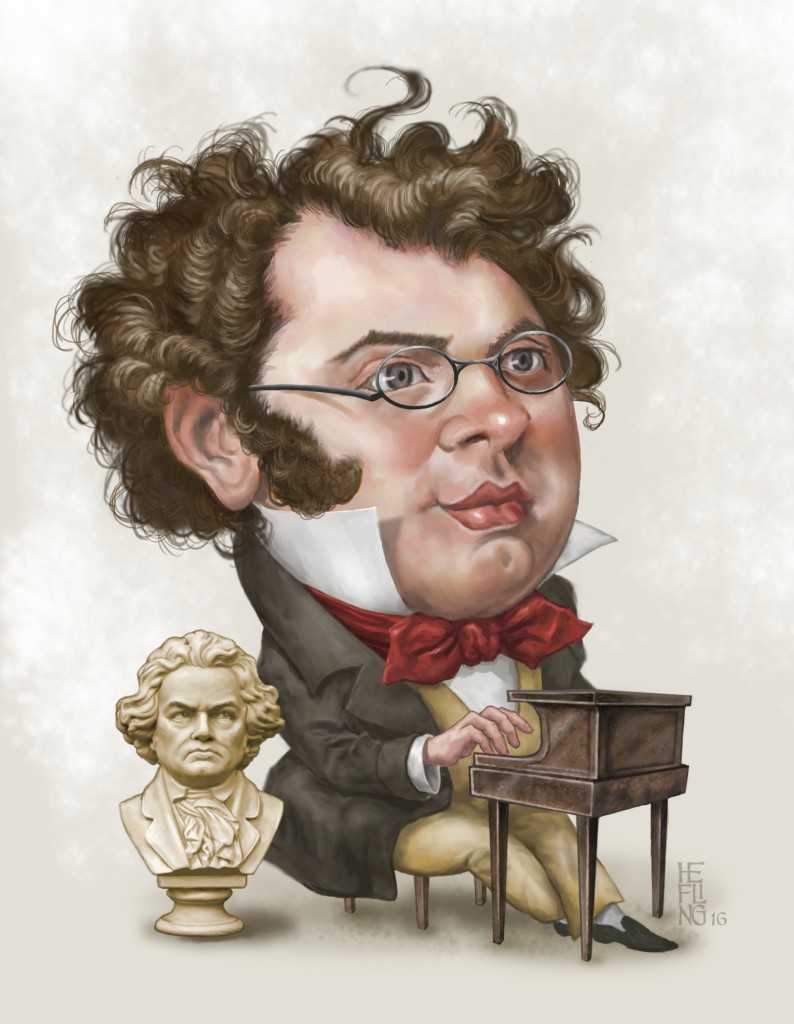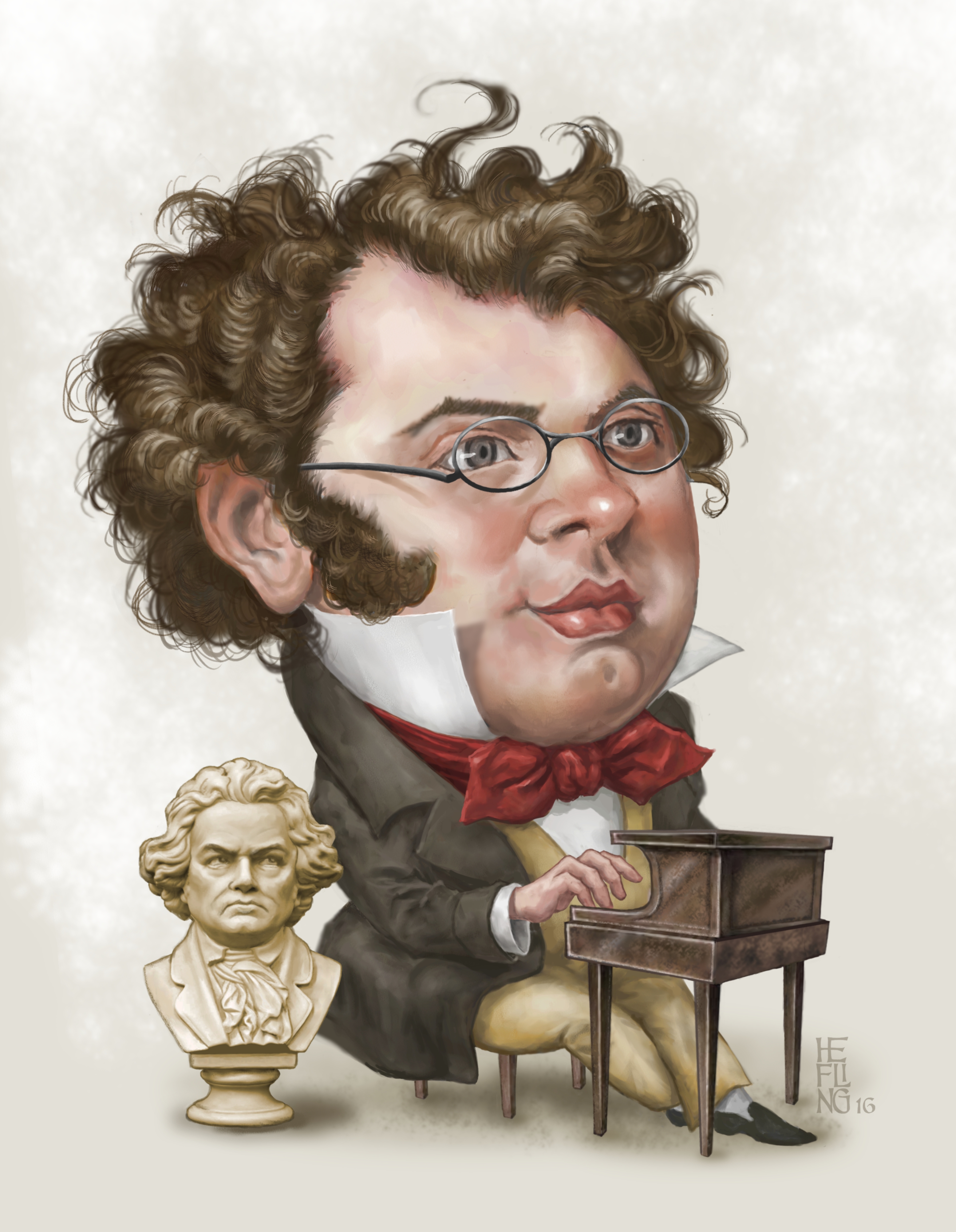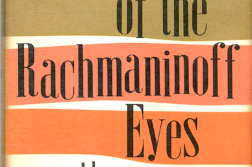MUSIC is a strange and miraculous form of communication. It can flow along in the background making a pleasant soundtrack for our activities when suddenly it somehow seizes our attention and the series of solid and hollow dots with flags becomes a profound and emotional conversation that completely absorbs us. This happened to me one day as the second movement of Franz Schubert’s famous String Quintet (D. 956) began. I heard a soul in trouble in deep conversation with its life; this conversation seemed to be taking place in a small, intimate place, a room big enough for only two voices, completely insulated from the world.
I began to research Schubert’s life, reading (in translation) the basic primary documents compiled by Otto Erich Deutsch. I was hoping to understand where such powerful but understated music came from. His circle of friends rightly regarded him as a musical genius and theorized that, when he composed, he was setting down inspirations from some heavenly source. Schubert scoffed at this and wrote in his diary (May 27, 1824): “What I produce is due to my understanding of music and to my sorrows.”
As to the nature of these sorrows, candidates are not lacking. He lived his life on the edge of poverty. He was a Deist in a conservative Catholic country. He hated the police state that exiled an early friend (Joseph Senn) for political activity, and although Vienna is a lovely city, it was at that time crowded and unhealthy, with a high suicide rate. He suffered from syphilis, which probably weakened him, so that he succumbed quickly to typhoid fever at 31. Finally, the Viennese musical public was enthralled with Rossini operas, forcing Schubert to waste a fair amount of time trying to invent a German version that would bring him success. It was in vain.
 His great achievement, the forging of his own musical language, took place in his room in the morning, where this disciplined composer gave himself entirely to his work. His highest achievement is music that is quiet, flowing, beautiful, devoid of rhetorical flourishes, but that transmits feelings so intense that often he places a louder, more dramatic section after it to disperse the emotion. I would not hesitate to call this room his spiritual closet.
His great achievement, the forging of his own musical language, took place in his room in the morning, where this disciplined composer gave himself entirely to his work. His highest achievement is music that is quiet, flowing, beautiful, devoid of rhetorical flourishes, but that transmits feelings so intense that often he places a louder, more dramatic section after it to disperse the emotion. I would not hesitate to call this room his spiritual closet.
In the afternoons and evenings, he socialized with friends in rowdy cafés and taverns. They were singers, musicians, poets, and students who gave drawing-room concerts of Schubert’s music, the famous “Schubertiads.” There was often food and dancing, with Schubert playing waltzes on the pianoforte but never dancing himself.
If Schubert was the musical center of this mostly male cultural group, the literary center was his best friend Franz Schober, who often held readings of contemporary and classical poets and playwrights in his home. Schober had a rather bad reputation in the group, and if he was spotted chatting with a woman at a Schubertiad, he was quickly warned off by a relative or friend of the lady. Nevertheless, the friendship between Schubert and Schober was considered to be strong by members of the circle, though some early members believed that Schober had “seduced” Schubert into a life of degradation (the term “slime” was used).
Schober has been generally portrayed as a “skirt-chaser,” but an unpublished letter recently discovered by David Gramit suggests a different reality, one that can explain the use of the “slime” comment. After Schober returned from living for a while in Breslau, where he hoped to work in the theater, he received a letter from one Antonio Mayer (dated Aug. 8, 1825), who apparently was an intimate enough friend of Schober’s to boast about his gay love life, albeit in coded terms. My conclusion is that Schober was very likely gay as well, but he understood that his minor aristocratic title didn’t ensure a decent income. His only choice was to find a wife who would give him more credibility as a candidate for a government post.
And Schubert? Anselm Hüttenbrenner, a close longtime friend, was of the opinion that Schubert had a marked aversion to women. On Nov. 30, 1823, Schubert wrote to the traveling Schober: “only you, dear Schober, I shall never forget, for what you mean to me, no one else can mean, alas!” The two friends referred to themselves collectively as “Schobert.” Although Schober was a mediocre writer, the two collaborated on an operetta (Alfonso and Estrella), which was meant to be Schubert’s big break into Rossini’s territory. When Schober wrote about the charming accommodations he had arranged in St. Pölten, he was in full nesting mode, praising their snug little room, the twin beds, the piano, and their daily routine of work on the project.
A more successful collaboration between the two is the narrative song “Viola,” D. 788. Schober’s poem is a somewhat silly allegory involving a violet who, mistakenly thinking she has heard the call of the god of Spring, “dresses” and prepares to meet her “bridegroom.” Soon realizing her mistake, she perishes of loneliness and rejection. It is very probable that Schober created this poem as a criticism of the Viennese musical public’s tardy and insufficient appreciation of his friend’s great musical gifts. If so, Schubert gave good value for his friend’s loyal effort. He created a brisk and varied musical narrative that rescues the text from camp and, through the device of a changing, recurring refrain, gives the story considerable emotional heft. The refrain is addressed to the only witnesses of the tragedy, the snowdrops blooming in late winter (known as “snowbells” in German).
In 1869, Eduard von Bauernfeld, who attended many Schubertiads, began preparing a memorial book and asked other members of the circle for their reminiscences of Schubert (who died in 1828). He asked Schober, presumably Schubert’s closest friend, about any “secret love life” that Schubert might have had. Schober reportedly responded that, indeed, there had been “a great love story,” but insisted he would never tell it, remarking that he wasn’t even sure it would be publishable. It is scarcely a stretch to assume that the story involved Schubert and himself.
The usual stance of music historians is to depict Schubert as the victim of frustrated love for Therese Grob, a friend of the Schubert family with an excellent coloratura soprano voice. In two years the young composer wrote over 200 songs for her. This fact has led many biographers to surmise that, because he couldn’t marry Therese, he renounced love and devoted himself to music. However, in reading the fragments of Schubert’s diary that remain, one soon gets to know an intelligent, realistic man, perspicacious in analyzing himself and others—no romantic fool. On September 8, 1816, Schubert wrote that life is often compared to a stage play in which each actor is given a part to play. In the case of life, our reviews are received after death, according to God’s laws. But, he muses, it can happen that God hands you a part you are unable to play. God is thus not always a careful director. My interpretation of this passage is that Schubert saw himself in the position of having to renounce the God-given roles of husband and father, knowing he was not able to fulfill them. He devoted himself to music by sequestering himself in a spiritual closet of his own making, insulating himself from the demands of society, concluding that this work was what he was created for.
Let us now consider another song, the beautiful “Du bist die Ruh’,” D. 776. This song sets a poem of Friedrich Rückert that celebrates the presence of one’s beloved as a healing balm, and love between two people as a benediction that can transform a tiny room into a paradise. This is perhaps Schubert’s ultimate love song: there is no bubbling stream, no singing birds, no moonlit forest, just two people in a room, and this combination is enough to create an intensely emotional aura. The simplicity and gentleness of the melody combined with the straightforward text suggests that he chose to set this song to express his gratitude for having experienced a love relationship. My contention is that this song was created to honor his relationship with Schober. The song celebrates finding love hidden from the prying eyes of a repressive church and state, and free of social pressure, experiencing the peace and trust that love can bring.
Whatever the contested circumstances of this quietly heroic man’s life, he was able to invent the means to allow us to share his “sorrows” and his triumphs, too, by forging a musical language that never confesses, never beats its breast, but like some universal folk music becomes part of us, once we have listened and decoded its intent.
Franz Schubert’s famous “Unfinished” Symphony was discovered in a drawer after his death and received its premiere only in 1865. The critic Eduard Hanslick was present and wrote that after only a few measures, even “every child recognized the composer, and a muffled ‘Schubert!’ was whispered in the audience. … Every heart rejoiced, as if, after a long separation, the composer himself were among us in person.”
Jeffrey Panciera is a writer based in Seattle.






